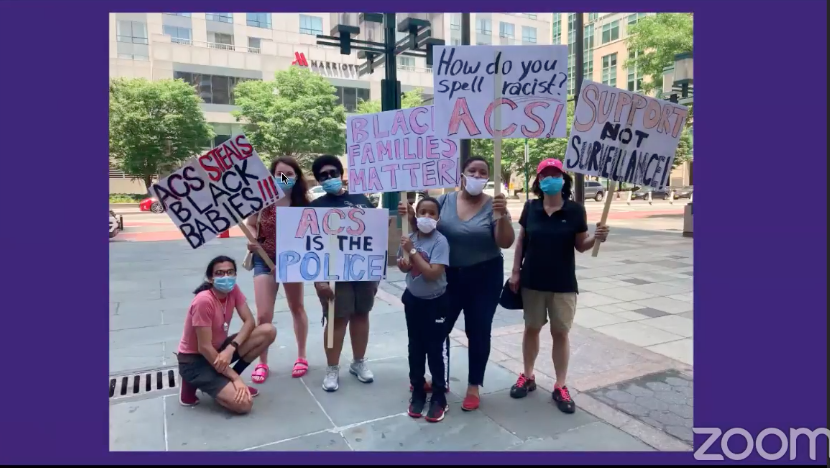
Movement for Family Power
Activists protest against the New York City Administration for Child Services in a photo shared during the Movement for Family Power’s webinar on June 23, 2020.
In 2018, Elizabeth Brico left her Florida home for three days following a fight with her mother-in-law. After her mother-in-law called Florida’s Department of Children and Families with an abandonment claim, her two daughters were taken from her. (Later, the claim didn’t hold up.)
During her case, Brico’s diagnosed opioid use disorder and her PTSD from severe intimate partner violence as a teenager were used against her.
Though in remission for her drug use, Brico refused a hair strand test because she didn’t know how they worked. This refusal was used against her.
“It was totally in my right to refuse that but it was used against me repeatedly, and it was implied that because I had refused it that it would have been positive,” Brico said. “When it was ultimately ordered and it was negative, they all seemed pretty embarrassed but at that point my children had already been taken from me and it didn’t really matter anymore.”
Brico’s parental rights have been terminated and her mother-in-law, who has custody of the children, is poised to adopt them.
Other parents have been treated in a similar manner when dealing with Child Protective Services (CPS), according to a report released Tuesday by the Movement for Family Power and co-published by the NYU Family Defense Clinic and the Drug Policy Alliance.
The report compiles leadership, research and activism on how CPS targets Black, Indigenous and Latino parents, especially mothers, in poverty. (There is a companion video.)
In 2017, over 500,000 parents were determined by the foster system to have mistreated their children, according to the report. Almost all were low-income and disproportionately Black, Indigenous, Latino and in some instances LGBTQ parents. Some studies estimate that over 80% of all foster system cases involve caretaker drug use allegations at some point, the report said.
Drug tests, decisions questioned
Researchers in the report question much of the science behind periods of mass drug use like the crack cocaine epidemic in the 1980s and ’90s. Through faulty research design, scientists at the time paid little attention to other variables, such as poverty.
“The scientific literature that suggests substance use produces social cognitive deficits
in parenting is underwhelming,” the report said. “For example, one study suggests that a very
small sample size of parents who use opioids find babies less cute. However, whether a parent finds their child cute is an entirely different inquiry from whether a child has been maltreated.”
Mistreatment, which is determined by a CPS investigator, is more commonly caused by lack of access to health care, housing and socioeconomic insecurity.
Child welfare agencies and family courts also use drug tests with severe consequences for parents but do not follow one of the main guidelines for testing. Agencies commonly use instant urine drug tests that are not accurate enough to support legal action against a person as evidence to remove children from homes, according to the report.
Hospitals serving Medicaid-eligible populations also routinely drug test pregnant women, new mothers and their newborns without providing informed consent. Medical providers turn over the results of these tests and any details from conversations they have with their patients to child protective agents, the report said.
In some cases, parents who use treatments such as methadone and buprenorphine (an opioid that treats pain and opioid use disorder) have had their children taken from them after giving birth, if the baby shows symptoms of neonatal abstinence syndrome, or withdrawal.
The New York City Administration for Child Services (ACS) said that by state and local policy neither a positive drug test of a parent nor a positive toxicology of a newborn baby is the basis for a determination that evidence of abuse or neglect exists.
Child protection staff must determine whether substance misuse impacts the child negatively or if the child is in imminent danger of being negatively affected. Staff must also assess if the parent’s ability to care for the child is impacted.
“Under ACS policy, a positive drug test in itself would never be the basis for removing a child,” an ACS spokesperson said. “In all of our cases, including those with substance misuse allegations, we assess child safety on a case by case basis, looking at actual or potential harm to a child and, if it exists, the parent’s capacity to safely care for the child. Through our prevention services, we engage parents in substance abuse treatment and other services to address risks to children.”
New York state’s Office of Children and Family Services (OCFS) said in a statement that screenings should only be done when medically indicated and that the Statewide Central Register of Child Abuse and Maltreatment does not accept reports for investigation when a mother is in medically assisted substance use disorder treatment.
“This moment in our history compels us to re-commit and address social and racial injustice with renewed energy and purpose,” OCFS said in a statement. “OCFS is committed to furthering our race equity work, which is inclusive of creating a foster parent advisory board, our youth accountability board; and our work with local districts to implement strategies in case practice, such as the blind removal process, to address disparities and improve outcomes for children and families of color.”
‘It’s always threats’
In order to get their children back, parents are often required to participate in drug treatment, mental health counseling, parenting classes and drug tests.
“In 2017, 5,916 parents in the Bronx were investigated for allegations of drug use (almost 20% of all investigations), and over 40% of those parents had a case indicated against them — meaning a caseworker decided there was at least ‘some credible evidence’ of maltreatment, even if there was more evidence of innocence,” the report said.
ACS said that each year on average, they conduct about 60,000 investigations involving about 90,000 children and only 20% to 25% include allegations of substance misuse, usually with other allegations too.
Dinah Ortiz, a private consultant and public speaker for child welfare abolition, was a functional drug user before her life changed and she became a chaotic user. At that time, she lost her family and friends, which made her want to use more as a means to numb herself.
After two years of incarceration, with her children the only thing getting her through the experience, she dedicated herself to helping those who lost their children.
“The majority of people that lose their children are Black, brown, Indigenous and are using drugs,” Ortiz said. “They can be functioning using drugs or they can be chaotically using drugs. There are no services for that. The service that they offer is prison. The service that they offer is we’re going to remove your child, we’re going to take you to court. It’s nothing but punitive measures. It’s always threats.”
ACS is addressing the racial disparity by requiring every ACS staffer to take an implicit bias training course. They are also “investing in community-based strategies” in historically marginalized neighborhoods to reduce child welfare involvement.
Parents need to know their rights, according to Ortiz, because if parents are uninformed, they will give CPS anything they ask for.
“Just like with the police, they cannot enter your house if you say that they cannot enter your house,” she said. “They need to have a police officer and they still need to have a court order stating that they have the right to enter your house.”
Ortiz said parents also have the right to prevent their kids from talking to CPS, with or without them. She recommends that parents reach out to public defenders in New York that work with parents in order to learn their rights.
“Seek a parent advocate if they come to your home with this threatening kind of demeanor,” she said. “You tell them ‘Hold on, I’ll speak with you but I need to find counsel first.’ They’re going to get upset and there are repercussions.”
CPS employees will have a bad taste in their mouths if parents stand up to them and will make it known that the agency will take them to court to take away your children, Ortiz said.
CPS’ mistreatment of parents and the removal of children does more than impact the children. Some of the effects on parents include suicide, depression, anxiety, post-traumatic stress disorder and postpartum depression.
“It’s a system that thrives in silence,” Brico said. “It’s a system that thrives in darkness.”





























